
If you have a smart phone, Google Maps can be very useful to show you how to get to places – either by walking, driving or by public transport. It will show you what times buses and trains leave.
You can use an app or website to find a route and bus times.
In most parts of the UK, you can buy a ticket before you get on the bus, or buy one from the driver when you get on the bus. You can pay using contactless payment with your bank card, or with cash.
To buy tickets in advance, check the bus company's website. To buy a ticket on the bus, tell the driver where you are going, or you can ask for a ‘day ticket’, for unlimited travel that day.
This depends on the area where you live. In many areas children under 5 travel free, and other children get a discount fare.
Buses will only stop at a bus stop they are scheduled to stop at. Bus stops will have either a board showing the bus routes that arrive at the stop, or a digital screen showing the next arrivals.
On the front of every bus, you'll see a number of the bus route and it's final destination.
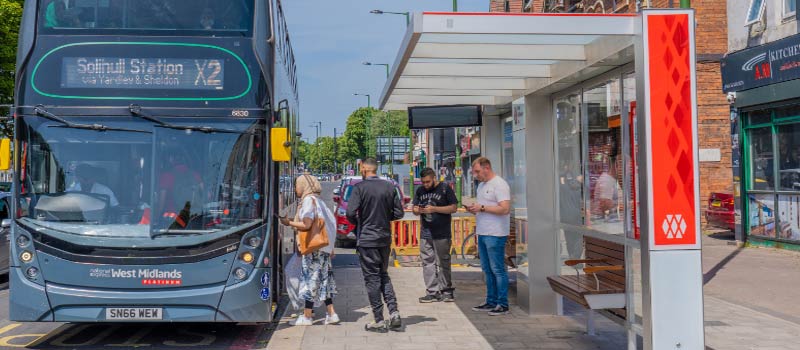
You should signal to the bus driver that you want them to stop by holding your arm out. After they let you on, you will need to pay the driver before taking your seat, or show a valid ticket.
Inside the bus, many buses will have a screen showing what the next stop is – but if not, you can ask the bus driver to tell you where your stop is. Before your stop, you should press one of the ‘stop’ buttons which will be throughout the bus, to tell the driver you want to get off.
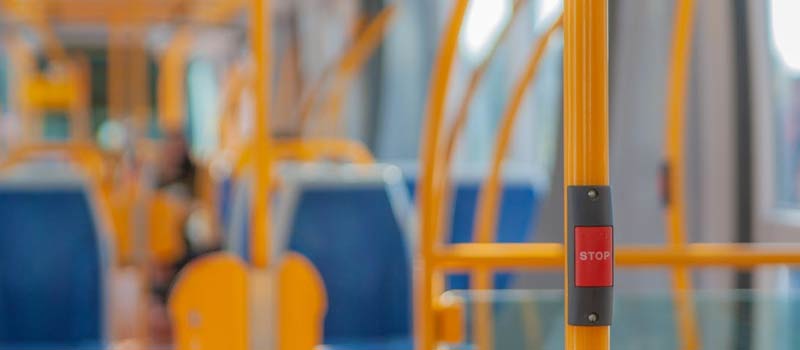
People who are older or who have certain disabilities can get free or discounted travel by getting a travel pass.
You can search for trains using one of many websites which will allow you to look up train times and buy tickets.
You should buy a ticket in the station before you get on the train, or in advance on the internet. Almost all stations have a ticket machine, and larger stations will have a ticket office. If neither is available, you can buy a ticket on the train from the ticket collector. You have the option to buy either a single journey ticket, or a return if you are coming back. A return ticket is usually cheaper than two single tickets.
When buying a ticket, you will see options for ‘off-peak’ and ‘any time’. Peak hours are before 9.30 – if you want wanting to travel before at this time, you will need an ‘any time’ ticket, . otherwise Otherwise, ‘off-peak’ tickets will be best. If buying a day return, this is only valid on the same calendar day – it is not a 24 hour24-hour period.
All stations have digital screens that will show you the next train to arrive at each platform. The screens will show the final destination of the train, the time it leaves, and the stops it will make, and the platform number.
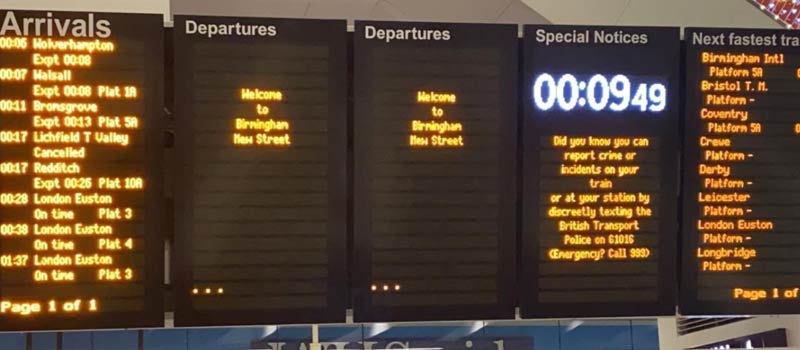
The platform will be a number, sometimes with a letter after, such as 12B. If there is a letter it is telling you how far down platform 12 you will need to stand to find your train. There will be signs across the station to guide you to the right platform.
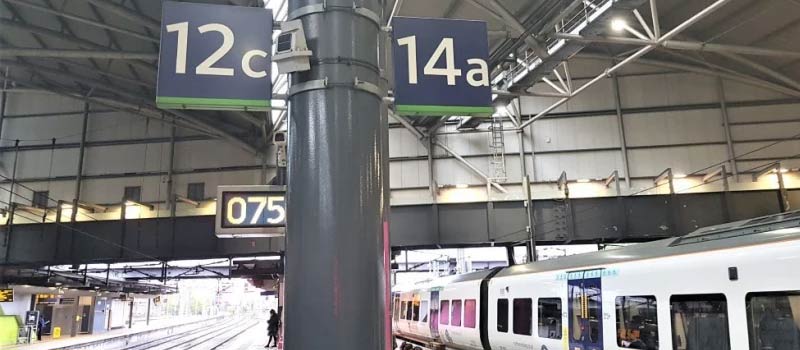
Some stations will have automatic ticket gates before the platform, where you will have to scan your paper ticket, or show a QR code if you have an electronic ticket on your mobile phone.
Local trains do not have seat reservations, so you can sit wherever there is space. Long-distance train routes sometimes have seat reservations – this will either be shown on a screen above the seat, or there will be a ticket card placed on the top of the chair.
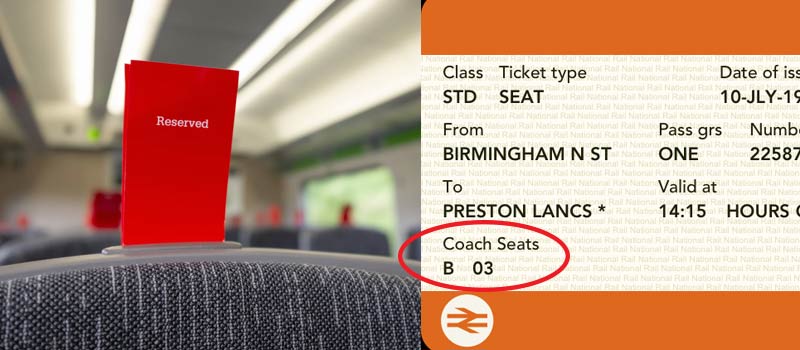
If your ticket has a reservation, find the right carriage and seat. The carriage will be a letter, such as 'C' and your seat number will be a number. The carriage letter will be displayed on the outside of the train.
If you don’t have a reservation, find an empty chair without a reservation. If the carriage has 'first class' on the outside you cannot sit in this carriage without a more expensive ticket.
If you have large luggage, there is often a luggage rack at the end of each carriage. If you have a small bag, you can put it on the overhead rack, or on the seat next to you.
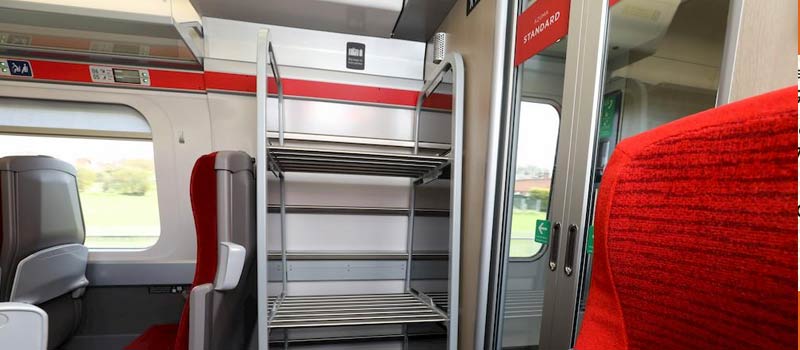
The name of each stop will be announced by the train driver shortly before it arrives. There is usually an electronic screen showing the upcoming stops.
Once your stop has been announced, gather your bags and walk to the nearest door. The doors may open automatically, but there is also an electronic button which you will need to press to get out on some trains.
It's usually cheapest to buy travel tickets in advance, up to 3 months before you travel. You can do this online from any train company website such as The Train Line. For the cheapest possible deal, the website splitmyfare.co.uk can find you the cheapest possible route to your destination.
If you regularly travel by train, you might consider buying a rail card, which will give you a discount on most train tickets. Not everyone is eligible to buy a rail card – you can check if you’re eligible on the National Rail website.
Some people, for example people with certain disabilities, can get a rail pass which gives them free or discounted travel.
You must be able to carry all your luggage yourself. The train staff can refuse to let you take very large items such as furniture and sports equipment on the train.
No
You can take bicycles on the train, but you may be refused if the train is busy.
There is support available at train stations for people with mobility needs, or who need help with luggage or getting around the station. This is called the 'Passenger Assist' service. The facilities at each station varies, so it's best to book this in advance.
Yes
If you have already bought a ticket, the train company must help you get to your destination. Talk to the train staff if possible - they may have arranged a replacement bus, or you can use your tickets on the next train that will get you to your destination.
You can use your ticket on the next train from the same rail company. Alternatively, you are entitled to a refund from where you bought the ticket.
Taxis are one of the most expensive ways to get around, but they can take you from door to door. Whilst some companies may allow you to book a taxi at a fixed fee, most taxis are paid for on a metred basis, depending on the length of your journey and time it took to get there. You will not pay extra if you have more than one person in the taxi. Taxi rides are not shared in the UK, so the driver will never pick up people you don’t know whilst you are on a journey.
It is safest and cheapest to book a taxi in advance. Bolt and Uber are the most popular apps for doing this.
You can take bicycles on the train, but you may be refused if the train is busy.
You can read about the rules of the road here.
The Omio website can show you your options for getting across the country.
You can buy tickets in advance online, or from your local coach station. There are several companies providing coach travel. Omio can help you find the cheapest tickets from across all coach providers.
Coaches will stop at all planned stops on the route. You do not need to ask the driver to stop. The driver will announce the name of the stop before you arrive.
If you regularly travel by coach, one of the companies, National Express offer an annual coach card which will give you a discount on all tickets on their routes. This is available to young people, older people and those with disabilities. You can check if you’re eligible and buy on their website.
No
Yes
You can search for trains using one of many websites which will allow you to look up train times and buy tickets.
You should buy a ticket in the station before you get on the train, or in advance on the internet. Almost all stations have a ticket machine, and larger stations will have a ticket office. If neither is available, you can buy a ticket on the train from the ticket collector. You have the option to buy either a single journey ticket, or a return if you are coming back. A return ticket is usually cheaper than two single tickets.
When buying a ticket, you will see options for ‘off-peak’ and ‘any time’. Peak hours are before 9.30 – if you want wanting to travel before at this time, you will need an ‘any time’ ticket, . otherwise Otherwise, ‘off-peak’ tickets will be best. If buying a day return, this is only valid on the same calendar day – it is not a 24 hour24-hour period.
All stations have digital screens that will show you the next train to arrive at each platform. The screens will show the final destination of the train, the time it leaves, and the stops it will make, and the platform number.

The platform will be a number, sometimes with a letter after, such as 12B. If there is a letter it is telling you how far down platform 12 you will need to stand to find your train. There will be signs across the station to guide you to the right platform.

Some stations will have automatic ticket gates before the platform, where you will have to scan your paper ticket, or show a QR code if you have an electronic ticket on your mobile phone.
Local trains do not have seat reservations, so you can sit wherever there is space. Long-distance train routes sometimes have seat reservations – this will either be shown on a screen above the seat, or there will be a ticket card placed on the top of the chair.

If your ticket has a reservation, find the right carriage and seat. The carriage will be a letter, such as 'C' and your seat number will be a number. The carriage letter will be displayed on the outside of the train.
If you don’t have a reservation, find an empty chair without a reservation. If the carriage has 'first class' on the outside you cannot sit in this carriage without a more expensive ticket.
If you have large luggage, there is often a luggage rack at the end of each carriage. If you have a small bag, you can put it on the overhead rack, or on the seat next to you.

The name of each stop will be announced by the train driver shortly before it arrives. There is usually an electronic screen showing the upcoming stops.
Once your stop has been announced, gather your bags and walk to the nearest door. The doors may open automatically, but there is also an electronic button which you will need to press to get out on some trains.
It's usually cheapest to buy travel tickets in advance, up to 3 months before you travel. You can do this online from any train company website such as The Train Line. For the cheapest possible deal, the website splitmyfare.co.uk can find you the cheapest possible route to your destination.
If you regularly travel by train, you might consider buying a rail card, which will give you a discount on most train tickets. Not everyone is eligible to buy a rail card – you can check if you’re eligible on the National Rail website.
Some people, for example people with certain disabilities, can get a rail pass which gives them free or discounted travel.
You must be able to carry all your luggage yourself. The train staff can refuse to let you take very large items such as furniture and sports equipment on the train.
No
You can take bicycles on the train, but you may be refused if the train is busy.
There is support available at train stations for people with mobility needs, or who need help with luggage or getting around the station. This is called the 'Passenger Assist' service. The facilities at each station varies, so it's best to book this in advance.
Yes
If you have already bought a ticket, the train company must help you get to your destination. Talk to the train staff if possible - they may have arranged a replacement bus, or you can use your tickets on the next train that will get you to your destination.
You can use your ticket on the next train from the same rail company. Alternatively, you are entitled to a refund from where you bought the ticket.
To buy a vehicle you'll need an address where it will be registered. There are no immigration requirements for buying a vehicle in the UK.
You can buy a second-hand vehicle through a local dealership, which may mean you get a warranty. Another option is buying second-hand from a private owner, which is usually cheaper, but can be more risky, especially if the warranty on the vehicle has run out.
Vehicles need to pass a test called an 'MOT' every year. If the vehicle has problems, they may tell you that you need to get these fixed before it can pass. The MOT is necessary before you can get tax for a vehicle.
All vehicles need to be taxed and insured. If you don’t have both tax and insurance, you will receive an automatic fine.
If you do not plan to use your vehicle and want to store it off road, you will need to inform the DVLA.
All vehicles need to be taxed and insured. If you don’t have both tax and insurance, you will receive an automatic fine.
The minimum level of insurance is called ‘third party’, which will cover expenses if you have an accident causing damage to other people or other people’s vehicles,
At a petrol station, you can pay for fuel at the pump if there is a card reader. Before you fill up, insert your debit or credit card, and enter your pin. You can then fill your car and leave.
If there is no card reader, you will need to fill your car first. Leave your car parked where it is, look to see what number your pump is, and then go into the petrol station. Tell the cashier the pump number, and then pay.
You can use this fuel cost calculator to estimate how much a particular journey will cost.
If you’re involved in a vehicle accident that has caused damage or injuries, here is what you need to do.
The law says that you must stop as soon as it’s safe to do so, even if it seems like a small accident.
Turn off the engine, and then turn on your the car’s hazard lights to show other road users that they need to be careful
Check whether you or anyone involved in the accident are injured. If there’s a medical emergency, call 999.
Dial 999 on a phone to speak to the emergency ambulance, police, fire or coastguard services.
999 calls are free and you do not need credit on your phone.
Yes. If you can't speak English, try saying the word ‘help’ in your own language, or say the name of your language. Stay on the line and don't hang up. The operator will try to identify your language and connect you to an interpreter service.
If there is someone nearby who can speak English it may be best to try and show them what has happened and get them to call.
Call 999. After you have connected, press ‘55’ on your phone. You will be transferred to the police. They will ask you simple yes or no questions, which you can respond to by tapping number buttons on your phone.
If you're using the Relay UK app, type the 999 button. If you're using a textphone, call 18000. You'll then be connected to a Relay Assistant. Tell them which emergency service you need.
The emergencySMS service is for people who are deaf, hard of hearing, or have speech impairments, letting them send SMS messages to 999. You need to register with this service before you can use it.
If the accident is blocking the road, dial 999 and ask for the police.
Dial 999 on a phone to speak to the emergency ambulance, police, fire or coastguard services.
999 calls are free and you do not need credit on your phone.
Yes. If you can't speak English, try saying the word ‘help’ in your own language, or say the name of your language. Stay on the line and don't hang up. The operator will try to identify your language and connect you to an interpreter service.
If there is someone nearby who can speak English it may be best to try and show them what has happened and get them to call.
Call 999. After you have connected, press ‘55’ on your phone. You will be transferred to the police. They will ask you simple yes or no questions, which you can respond to by tapping number buttons on your phone.
If you're using the Relay UK app, type the 999 button. If you're using a textphone, call 18000. You'll then be connected to a Relay Assistant. Tell them which emergency service you need.
The emergencySMS service is for people who are deaf, hard of hearing, or have speech impairments, letting them send SMS messages to 999. You need to register with this service before you can use it.
Give your name and address to the other people who were involved. The law requires this, but you don’t have to give your phone number.
Ask for their name and address. If they won’t tell you, dial 101 on your phone to speak to the police.
If you have hit a parked car and the owner isn’t there, write your details on a piece of paper and slide this under the windscreen wipers so they can find it.
At this stage, it’s usually best not to admit that the accident was your fault. The police or insurance companies will decide that later.
If possible make a note of the following:
If there are other witnesses, you could ask for their contact details now.
You should report the accident to the police within 24 hours if you couldn’t exchange contact details with the other driver, or if anyone was injured. You can do this online, or at a police station.
If you want to make an insurance claim, contact the insurer as soon as you can. If there is very little damage, such as a small mark or scratch, you might not want to make an insurance claim.
You must have a valid drivers licence, a valid MOT certificate for your vehicle, vehicle insurance and vehicle tax.
All vehicles drive on the left hand side of the road, and all speed limits are in miles per hour. Everyone in a car must wear a seatbelt, and the law requires that young children must be in a child seat.
You can read the full rules of the road here:
You can check whether your licence is valid using this tool:
This is a national scheme that lets people with mobility problems park close to where they need to go. Often you will be able to park for free, but not always.
The Blue Badge lets you park for a limited time in some areas where it's normally not allowed, such as on double yellow lines. But there are still some places where Blue Badge holders aren't allowed to park, including bus lanes, taxi bays, and areas where loading or unloading isn't allowed.
A disabled parking bay is a reserved area on the road for people who have a Blue Badge. If you would like to have a disabled parking bay near your home, you can apply through your council.
You can borrow mobility aids like walking sticks and wheelchairs from the NHS. Speak to a GP or hospital staff about your needs.
The Red Cross also let you borrow or rent mobility aids.
Shopmobility also rent mobility aids out for people to do shopping or visit leisure facilities in a town or shopping centre.
